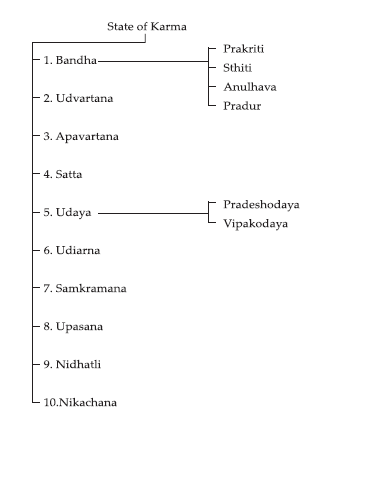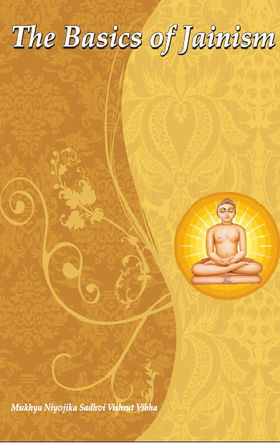Some people believe that karma is powerful and is the doer of whatever takes place in their lives. But this notion is incorrect and should be discarded. If everything happens only because of karma then there would be no efforts made for attaining salvation. Karmas have their own limitations of cause and effect and can be nullified to a certain extent.
A person performs good or bad actions, which cause the bondage of karma. Karma itself does not act independently in giving its fruit. Dravya (person), kshetra (place), kala (time), and bhava (modes) are four factors or parameters which influence the functioning of karma. We sleep because of the existence of darsanavarniya karma. Here I would like to cite an example. While reading this book you might be sleepy. This is because of rise of this karma. But since you are listening to this precept attentively, the effect of darsanavarniya karma has been nullified. Say you don't go to asleep during the daytime and you don't sleep until ten at night. This does not mean that darsanavarniya karma does not exist during daytime. In reality the karma is in existence, but it gives its fruits only in accordance with dravya, kshetra, kala and bhaava. We go to sleep in one place but not in another. Sometimes we get sound and sometimes we are disturbed. Place and time are two powerful factors which affect the fruition of karma. Living beings doomed in hell don't get sleep because of the painful tortures experienced by them. But we cannot take it for granted that they have destroyed darsanavarniya karma. As a matter of fact, darsanavarniya karma exists there, but the beings in hell don't get sleep because of their sufferings. Hence, these are the limitations of the karmas in giving their fruits or results which are not solely responsible for all the effects.
States of Karma
There are ten states of karma viz.
- Bandha (bondage):
- Prakriti (nature)
- Sthiti (duration)
- Anubhava (intensity)
- Pradesh (mass of karmic matter).
- Udvartana (augmentation):
Augmentation is the process of increase in the duration and intensity of karma.
- Apavartana (attenuation):
Attenuation is the process of decrease in the duration and intensity of karma.
- Satta (existence):
Existence is the time between non-fruition and persistence.
- Udaya (realisation):
- Udirana(premature realisation):
Premature realisation is the realisation before the fixed time.
- Samkramana (transference):
It is the mutual transformation of the subtypes belonging to the same genus. In this respect the mutual transformation takes place between the substance of the same type of karma. The samkramana of subtypes of gyanavarniya, darsanavarniya, vedniya, nama, gotra, antaraya is possible but the subtypes of ayusya and mohaniya cannot be inter- changed. For instance, with regard to darsanavarniya karma transformation between the chakshu and achakshu darsanavarniya is possible.
- Upasama (subsidence):
Subsidence is the process which makes deluding karma (mohaniya karma) unfit for self-realisation, premature realisation and nidhatti and nikachana
- Nidhatti:
Incapability of all these process except augmentation and attenuation.
Nidhatti is the process which makes the deluding karma incapable of all these processes except augmentation and attenuation. - Nikachana: (Incapacitation of all these process)
The condition which renders such karmic matter incapable of all these operations is called nikachana.
Bondage is the coalescence or assimilation of karmic matter by the soul. In this state the karmic particles get merged with the soul, just as the mixture of water and milk is inseparable. Bondage is of four types:
When karma gets bound to the soul, it does not get the power to be identified immediately, it requires a definite time to nurture itself and till that time it remains in the dormant stage.
Udaya is the state of realisation of karmas. It is of two types.
Fradeshodaya - When the realisation of karma takes place within the space points of the soul (atmapradesh) and cannot be experienced outwardly it is known as pradeshodaya.
Vipakodaya - When the fruition of karma takes place and can be experienced outwardly it is known as Vipakodaya.
The theory of karma as propounded by Lord Mahavira is meticulous. In this context the Lord ordained or formulated various aspects of mutually changeable formations in karmas such as udirana, samkramana and apavartana. He laid down that karma could be changed or annihilated. Its fruit could be enjoyed or experienced prematurely or belatedly. Through proper efforts karmas can undergo change conditionally. The principle of samkramana has a scientific basis. Modern scientists are making efforts to bring about changes in the future generations through genetic research.The principle of samkramana in Jainology may find consistency with the modern scientific experiments in the genetic field. As it was said earlier, Jainism believes not only in karma but also in kala (time), suabhava(nature), purusartha (effor), and niyati (destiny/fate).
It is an established fact that inauspicious karmas can be transformed into auspicious ones and vice versa, due to our intense efforts or serious lapses. I would like to elaborate this statement with the following example:-
An astrologer once predicted the future for two brothers. He told the elder one that he would be hanged within a certain period while he told the younger one that he was destined to be a king. Both were taken aback because they thought it first to be absurdity. After returning home the elder one thought that the astrologer's word might come true. He became alert and cautious. With strenuous efforts he turned over a new leaf with the vision of death facing him.
On the other hand the younger one aspired to be a king. He became extremely careless and reckless. He fell an easy victim to bad habits, which degraded his personality beyond imagination.
After some days the elder brother was going somewhere when a thorn pricked his feet. He suffered for some days. The younger one was passing by a hut and spotted a particular area which he dug and found a bag full of gold coins.
After four months, the brothers approached the astrologer and told him that his words had not come true. The astrologer affirmed that his predictions seldom failed. He explained to them that the elder brother had improved his behaviour completely and that is why the punishment of being hanged changed to being pricked by a thorn. The younger one was told that he had become too careless and proud and so his reward of getting the kingdom was reduced to simply a bag of gold coins.
Thus it is crystal clear that behaviourial patterns, good or bad can influence and contribute to the respective changes in the modes of karma to a great extent.
The person who has grasped the meaning of karmavada cannot be dogmatic or eccentric. He steers clear of evils. It is a principle of karmavada that the fruit of good karma is favourable and that of bad karma is unfavourable. It is the foundation of our moral values. When a person is convinced that the result of bad karma will be bad, he tries to abstain from the evil deeds. He would never indulge in any evil practice like adulteration, theft etc. In fact the principle of karmavada is of utmost importance to ensure moral values in the day to day lives of the people at large.
The theory of karmavada energizes the positivity in life and brings enthusiasm and activity. After believing it staunchly one would certainly think twice before falling prey to hopelessness, inactivity or laziness. One would remain undisturbed by happiness and sorrow alike.
It is karma which is responsible for the cycle of birth and death. Our present state is due to our past karma. A person enjoys or suffers only because of his attachment to relevant karma.
We shape our destiny in accordance with our ideas, God is not responsible for our present condition. We ourselves are responsible for it. If we properly understand the mystery of karma, we can shape a bright future and achieve our goal through progress.
The soul is not under the subjugation of any external agency. There is no need to knock on the door of God to achieve our goal. For the upliftment of the soul, it is not necessary to beg anything from anyone. Jain philosophy holds that all souls are equal and have similar potentialities.
According to karmavada, a soul which attains the higher stage of development becomes a pure soul or paramatma itself. A soul's energy is obstructed by karma but one can overcome the hurdles by unveiling the coverings through development of inherent powers. Each and every soul can elevate itself through its own efforts.

